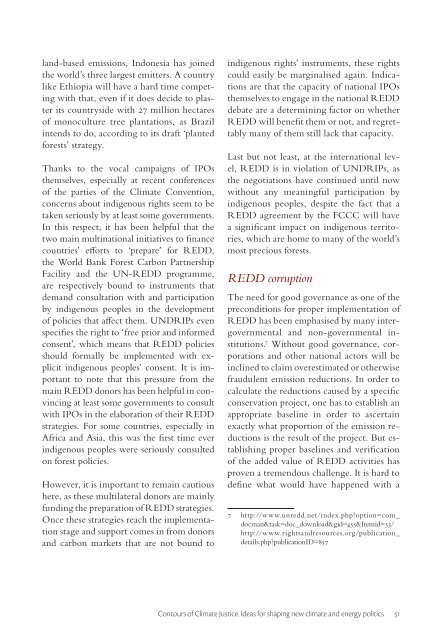Contours of Climate Justice - Dag Hammarskjöld Foundation
Contours of Climate Justice - Dag Hammarskjöld Foundation
Contours of Climate Justice - Dag Hammarskjöld Foundation
Create successful ePaper yourself
Turn your PDF publications into a flip-book with our unique Google optimized e-Paper software.
land-based emissions, Indonesia has joined<br />
the world’s three largest emitters. A country<br />
like Ethiopia will have a hard time competing<br />
with that, even if it does decide to plaster<br />
its countryside with 27 million hectares<br />
<strong>of</strong> monoculture tree plantations, as Brazil<br />
intends to do, according to its draft ‘planted<br />
forests’ strategy.<br />
Thanks to the vocal campaigns <strong>of</strong> IPOs<br />
themselves, especially at recent conferences<br />
<strong>of</strong> the parties <strong>of</strong> the <strong>Climate</strong> Convention,<br />
concerns about indigenous rights seem to be<br />
taken seriously by at least some governments.<br />
In this respect, it has been helpful that the<br />
two main multinational initiatives to fi nance<br />
countries’ eff orts to ‘prepare’ for REDD,<br />
the World Bank Forest Carbon Partnership<br />
Facility and the UN-REDD programme,<br />
are respectively bound to instruments that<br />
demand consultation with and participation<br />
by indigenous peoples in the development<br />
<strong>of</strong> policies that aff ect them. UNDRIPs even<br />
specifi es the right to ‘free prior and informed<br />
consent’, which means that REDD policies<br />
should formally be implemented with explicit<br />
indigenous peoples’ consent. It is important<br />
to note that this pressure from the<br />
main REDD donors has been helpful in convincing<br />
at least some governments to consult<br />
with IPOs in the elaboration <strong>of</strong> their REDD<br />
strategies. For some countries, especially in<br />
Africa and Asia, this was the fi rst time ever<br />
indigenous peoples were seriously consulted<br />
on forest policies.<br />
However, it is important to remain cautious<br />
here, as these multilateral donors are mainly<br />
funding the preparation <strong>of</strong> REDD strategies.<br />
Once these strategies reach the implementation<br />
stage and support comes in from donors<br />
and carbon markets that are not bound to<br />
indigenous rights’ instruments, these rights<br />
could easily be marginalised again. Indications<br />
are that the capacity <strong>of</strong> national IPOs<br />
themselves to engage in the national REDD<br />
debate are a determining factor on whether<br />
REDD will benefi t them or not, and regrettably<br />
many <strong>of</strong> them still lack that capacity.<br />
Last but not least, at the international level,<br />
REDD is in violation <strong>of</strong> UNDRIPs, as<br />
the negotiations have continued until now<br />
without any meaningful participation by<br />
indigenous peoples, despite the fact that a<br />
REDD agreement by the FCCC will have<br />
a signifi cant impact on indigenous territories,<br />
which are home to many <strong>of</strong> the world’s<br />
most precious forests.<br />
REDD corruption<br />
The need for good governance as one <strong>of</strong> the<br />
preconditions for proper implementation <strong>of</strong><br />
REDD has been emphasised by many intergovernmental<br />
and non-governmental institutions.<br />
7 Without good governance, corporations<br />
and other national actors will be<br />
inclined to claim overestimated or otherwise<br />
fraudulent emission reductions. In order to<br />
calculate the reductions caused by a specifi c<br />
conservation project, one has to establish an<br />
appropriate baseline in order to ascertain<br />
exactly what proportion <strong>of</strong> the emission reductions<br />
is the result <strong>of</strong> the project. But establishing<br />
proper baselines and verifi cation<br />
<strong>of</strong> the added value <strong>of</strong> REDD activities has<br />
proven a tremendous challenge. It is hard to<br />
defi ne what would have happened with a<br />
7 http://www.unredd.net/index.php?option=com_<br />
docman&task=doc_download&gid=455&Itemid=53/<br />
http://www.rightsandresources.org/publication_<br />
details.php?publicationID=857<br />
<strong>Contours</strong> <strong>of</strong> <strong>Climate</strong> <strong>Justice</strong>. Ideas for shaping new climate and energy politics 51
















